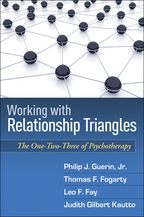Working with Relationship Triangles
The One-Two-Three of Psychotherapy
Philip J. Guerin, Jr., Thomas F. Fogarty, Leo F. Fay, and Judith Gilbert Kautto
HardcoverPaperback
Hardcover
orderOctober 4, 1996
ISBN 9781572301436
Price: $65.00 251 Pages
Size: 6" x 9"
Paperback
orderMarch 23, 2010
ISBN 9781606239179
Price: $43.00 251 Pages
Size: 6" x 9"
Virtually all significant relationships are shadowed by a third party-another person, a competing distraction, or even a memory. This groundbreaking book provides clinicians with a hands-on guide to working with many different kinds of relationship triangles in therapy with families, couples, and individuals. The authors show why triangles come into being, how to predict their evolving nature, and how they can be dealt with and resolved in treatment. A wealth of clinical case material and treatment suggestions illustrates how thinking in terms of threes, as well as individuals and dyads, can greatly increase therapeutic flexibility and effectiveness. The paperback edition includes a new series editor's note by Michael P. Nichols.
“A valuable resource for clinicians of all disciplines, from trainee onwards. It codifies the concept of relationship triangles, offers a constructive framework for useful intervention, develops the idea, and underpins all of this with a rich abundance of clinical vignettes.”
—Therapy Today
“This invaluable new addition to the treatment literature will be appreciated by the student, the novice or experienced psychotherapist, and the educator....The authors provide a richly conceptualized treatment that is patient centered and process oriented, with self-focused awareness as the goal. As a clinician, one feels renewed optimist for providing care after reading this book.”
—Psychiatric Services
“Philip Guerin and his colleagues don't claim that they're riding the crest of the next theoretical wave. They don't spout new jargon to describe what they do, nor claim a special understanding of therapy available only to a few. Instead, they let us in on how they've taken one ideathe emotional triangleand worked with it over the past 25 years, finding richness and depth along the way....Working with Relationship Triangles is one repository of hard-won wisdom that's worth having in your knapsack when the miracle question flops.”
—Networker
“This book is an excellent resource for therapists wanting to work from a structural and multigenerational family therapy perspective. It makes clear clinically what Bowen and others have written about theoretically. The case studies are particularly helpful in understanding the finer workings of triangles.”
—Journal of Family Psychotherapy
“This text takes triangles, a concept central to structural and multi-generational family therapy, to the next level of theoretical refinement and clinical usefulness. Easy to read, rich with clinical examples, I recommend it highly to therapists of all persuasions.”
—Salvador Minuchin, M.D.
“Will be valuable to individuals in a range of disciplines, whether students in training or beginning or experienced practitioners....Unlike too much literature in this field, this book provides a great richness of detail on the theoretical history of triangles and the strategies for assessment and intervention. The volumes's specific guidelines for clinical management will be extremely helpful to any therapist working with individuals, dyads, and/or families. Every chapter contains enormously useful case illustrations gleaned from the many years of clinical experience of the well-known and highly respected practitioner authors.”
—Mary Ann Quaranta, DSW, Dean, Fordham University Graduate School of Social Service
Table of Contents
Series Editor's Note, Michael P.Nichols1. Relationship Triangles: Evolution of the Concept
2. The Relevance of Triangles in Clinical Context
3. Addressing Triangles in Therapy
4. The Structure of Relationship Triangles
5. Emotional Process within Triangular Structure
6. The Interaction of Structure, Process, and Function
7. Introducing Triangles in Individual Therapy
8. Coaching and Direct Intervention with Triangles in Individual Therapy
9. Extrafamilial Triangles in Marital Conflict
10. Marital Triangles within the Family
11. Child and Adolescent Triangles
12. Symptomatic Child and Adolescent Triangles within the Family
13. Conclusion: Becoming a "Triangle Doctor"
About the Authors
Philip J. Guerin, Jr., MD, the founding director of the Center for Family Learning in Rye Brook, New York, is the originator of the genogram and cognitive systems models of psychotherapy for families, couples, and individuals. A former faculty member at Albert Einstein College of Medicine, Fordham University Graduate School of Psychology, and the University of South Alabama School of Medicine, he is the senior author of the highly regarded text The Evaluation and Treatment of Marital Conflict.Thomas F. Fogarty, MD (deceased), a cofounder of the Center for Family Learning, served on the faculties of Albert Einstein College of Medicine and the Pastoral Counseling Institutes of St. John’s University and Iona College. Highly regarded as a creative teacher and clinician, Dr. Fogarty practiced his model of family systems in Westchester County, New York, for more than 40 years.
Leo F. Fay, PhD, a retired Associate Professor of Sociology at Fairfield University, now resides in Arizona and serves on the visiting faculty of the Center for Family Learning. He is a coauthor of The Evaluation and Treatment of Marital Conflict.
Judith Gilbert Kautto, ACSW, a faculty member and former Director of Postgraduate Education at the Center for Family Learning, maintains a full-time private practice in Westchester County, New York, and is a coauthor of The Evaluation and Treatment of Marital Conflict.
